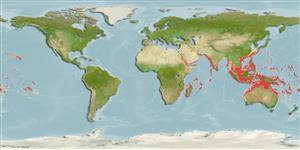>
Eupercaria/misc (Various families in series Eupercaria) >
Lutjanidae (Snappers) > Lutjaninae
Etymology: Lutjanus: Malay, ikan lutjan, name of a fish.
Environment: milieu / climate zone / depth range / distribution range
Ekologi
laut; air tawar; payau berasosiasi dengan karang; kisaran kedalaman 0 - 180 m (Ref. 37816), usually 10 - 70 m (Ref. 30573). Tropical; 31°N - 33°S, 31°E - 128°W (Ref. 55)
Indo-Pacific: East Africa to the Marquesas and Line islands, north to the Ryukyu Islands, south to Australia. More common around oceanic islands than in continental areas.
Length at first maturity / Size / Weight / umur
Maturity: Lm 42.9, range 39 - ? cm
Max length : 90.0 cm TL jantan/; (Ref. 9987); common length : 76.0 cm SL jantan/; (Ref. 37816); Berat maksimum terpublikasi: 12.5 kg (Ref. 4699); Umur maksimum dilaporkan: 55 Tahun (Ref. 72420)
Duri punggung (Keseluruhan (total)): 10; duri punggung lunak (Keseluruhan (total)): 13-14; Duri dubur 3; Sirip dubur lunak: 8. This species is distinguished by the following characters: moderately deep body, its greatest depth 2.4-2.9 in SL; distinct groove or pit from nostrils to the front of the eye; preopercular notch and knob moderately developed; vomerine tooth patch narrow crescentic, without a medial posterior extension; gill rakers of first gill arch 6-7 + 16 = 22-23 (including rudiments). Colour of body dark reddish-brown with faint dark stripes; young and some adults with two silvery-white spots on back; pectoral fins pink with dorsal edge prominently black; juveniles sometimes have caudal end of body and the tail white. mimicking Chromis damselfishes (Ref. 9821, 90102).
Adults inhabit coral reefs, including sheltered lagoons and outer reefs (Ref. 30573). Usually found singly, often adjacent to steep outer reef slopes, but occasionally found in groups (Ref. 9710). Feeds mainly on fishes, but also take shrimps, crabs, amphipods, stomatopods, gastropods and urochordates. Large fish from oceanic areas in the western Pacific are often ciguatoxic, e.g., in Tuvalu (Ref. 9513). Caught mainly with handlines and bottom longlines (Ref. 9821). Utilized fresh and dried-salted (Ref. 9987). Juveniles mimic Chromis damselfishes (Ref. 90102). Minimum depth reported taken from Ref. 128797.
Allen, G.R., 1985. FAO Species Catalogue. Vol. 6. Snappers of the world. An annotated and illustrated catalogue of lutjanid species known to date. FAO Fish. Synop. 125(6):208 p. Rome: FAO. (Ref. 55)
Status IUCN Red List (Ref. 130435)
ancaman kepada manusia
Reports of ciguatera poisoning (Ref. 4690)
penggunaan manusia
Perikanan: komersial; Ikan buruan: ya
Alat, peralatan
laporan khas
muat turun XML
Sumber internet
Estimates based on models
Preferred temperature (Ref.
123201): 24.5 - 29, mean 28 °C (based on 2402 cells).
Phylogenetic diversity index (Ref.
82804): PD
50 = 0.5000 [Uniqueness, from 0.5 = low to 2.0 = high].
Bayesian length-weight: a=0.01349 (0.00896 - 0.02030), b=2.99 (2.87 - 3.11), in cm total length, based on LWR estimates for this species & Genus-body shape (Ref.
93245).
Trophic level (Ref.
69278): 4.3 ±0.5 se; based on diet studies.
Daya lenting (Ref.
120179): sedang, Waktu penggandaan populasi minimum 1.4 - 4.4 tahun (K=0.11-0.33; tmax=13).
Prior r = 0.41, 95% CL = 0.23 - 0.71, Based on 1 stock assessment.
Fishing Vulnerability (Ref.
59153): High to very high vulnerability (69 of 100).
Climate Vulnerability (Ref.
125649): Very high vulnerability (85 of 100).
Nutrients (Ref.
124155): Calcium = 18.4 [11.0, 26.7] mg/100g; Iron = 0.245 [0.156, 0.388] mg/100g; Protein = 18.8 [17.2, 20.1] %; Omega3 = 0.142 [0.101, 0.196] g/100g; Selenium = 77.5 [48.8, 127.5] μg/100g; VitaminA = 130 [22, 516] μg/100g; Zinc = 0.44 [0.35, 0.59] mg/100g (wet weight); based on
nutrient studies.
